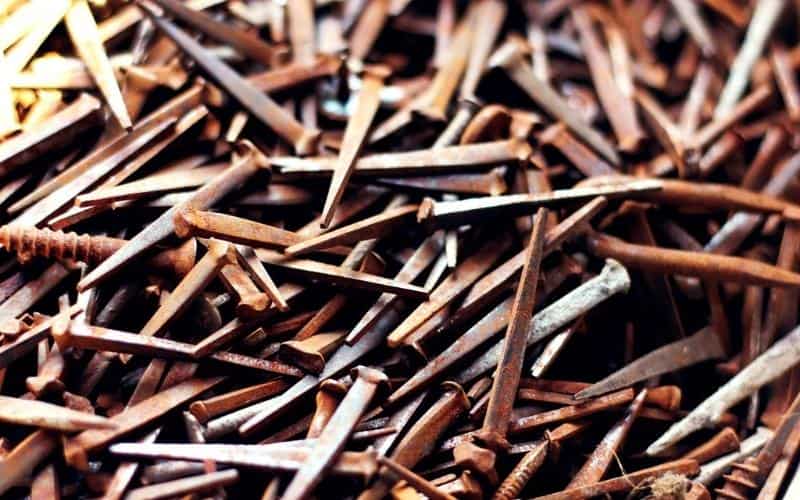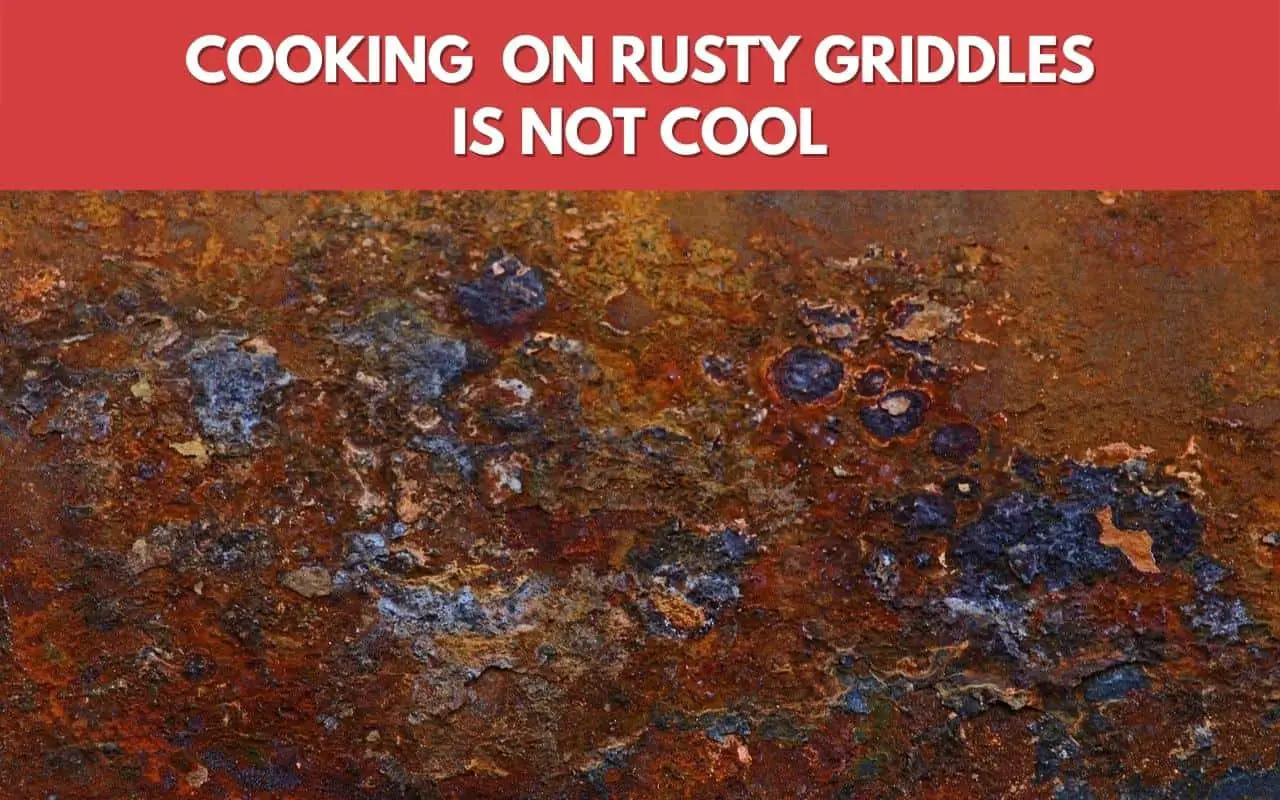We’ve all been there. You haven’t used your Blackstone griddle in a while and when you pull it out of the shed it’s looking a little rusty.
Mmm, rust looks just like cinnamon, right? So cooking on a rusty griddle must be like adding a unique flavor to your food, right?
Wrong. Rust takes like iron.
Don’t know how iron tastes? Well, your blood tastes like iron. So, if you had a tooth pulled at the dentist or someone landed a punch on your mouth you probably know how blood tastes. And that’s how rust tastes. Now, do you want your food to taste like that?
Probably not. Unless you are a vampire.
All the jokes aside, cooking on a rusty griddle is simply not a good idea.
Although rust is not toxic unless consumed in larger quantities where it could cause iron overdose, cooking on a rusty griddle is generally not a good idea. The rusty bits will transfer to your food, making it unappealing and potentially changing the taste. You are better off cleaning the rust off before your next cookout.
Want to learn more about the toxicity of rust and how to quickly remove it off your griddle top? Read on!
Table of Contents
- Is Rust Toxic?
- But Rusty Metal Is The Source of Tetanus Infection!
- I Need to Get Rid of the Rust Quickly. What Should I Do?
- Rust Prevention is the Best Solution
- Final Thoughts
Is Rust Toxic?
This is a very frequent question that floats among the BBQ-loving community.
Rust is an iron oxide formed when iron comes into contact with oxygen and water. The result of the oxidation process is the red-orange substance that we call rust.
Iron is required for the human body to function properly. If your intake of iron is too low, you can develop anemia. However, consuming too much elemental iron is also not good for you and can lead to iron overdose, which can be fatal.
So while rust is not inherently toxic, consuming large amounts of it can be harmful.
Although it’s unlikely that you would consume enough rust to cause any harm, it’s still not a good idea to cook on a rusty griddle. And that’s especially true if you’ve got kids because they are more prone to iron poisoning than adults.
But Rusty Metal Is The Source of Tetanus Infection!
No, it’s not.
Let me explain.
I am sure you’ve been warned to be careful and not step on rusty nails as a kid. The reason why you’ve been warned is tetanus.

Tetanus or lockjaw is an infection caused by bacteria called Clostridium tetani. These bacteria are commonly found in soil and animal feces.
The infection usually occurs when the bacteria enter the bloodstream through an open wound, like a cut or puncture. The puncture can be caused by a rusty nail of course. However, it’s not the rust that causes the infection, it’s the bacteria that got on the rusty nail in the first place. You could get tetanus even if the nail wasn’t rusty at all.
So, no, rust will not cause tetanus infection.
Also, think about how you are preparing the food on your griddle. Griddles get really hot. I mean over 500 degrees Fahrenheit hot. Do you think any germs hiding in the rust would survive such high temperatures?
Still, I see no reason to cook on a rusty griddle. Just stop reading and clean the rust off.
I Need to Get Rid of the Rust Quickly. What Should I Do?
Yes, I know you need the griddle ready for the party tonight. But hey, safety first!
There are a few ways you can clean the rust off your griddle quickly and easily.
The quickest way to remove it is by using a power tool such as an orbital sander. It will take care of the rust in no time.
If you don’t have an orbital sander, you can use sandpaper, steel wool, or a wire brush to scrub the rust off.
Read my detailed rust removal guide for more info.
Keep in mind that even if you remove the rust quickly, you will still have to reapply the seasoning unless you want your burgers to stick to the griddle like glue. It will at least half an hour to do a couple of coats of seasoning.
Rust Prevention is the Best Solution
The best way to deal with rust is to prevent it in the first place. As we’ve discussed, rust is formed when iron comes into contact with oxygen and water. So the solution is simple – keep your griddle dry and clean there will be no rust.
Unfortunately, it is not always that simple because moisture is present in the air. Even if you live in a dry climate, your griddle will still rust eventually.
The good news is that there are a few things you can do to prevent rust from forming in the first place.
You can do that by:
- Keeping your griddle clean and dry when you are not using it
- Apply a thin layer of cooking oil on the surface after each use and before storing it
- Not leaving it outside exposed to elements
- Storing it in a dry sheltered place
Also, when you first notice rust on your griddle, remove it as quickly as you can. Once it is in one spot, it will spread like a plague until the whole griddle is consumed. Sure, the griddle won’t get ruined, but it’s going to be a tougher job to remove all the rust if you let it spread.
Final Thoughts
Cooking on a rusty griddle is not a good idea. While rust, or iron oxide, is not inherently toxic, consuming large amounts of it can be harmful. Also, the rust can alter the taste of your food.
Therefore, the best course of action is to remove it from the griddle before you use it for your barbecue party. It is of course best to prevent rust from forming in the first place by keeping your griddle oiled, clean from food debris, and dry.
References:


